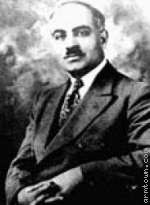Genocide: An inconvenient truth
The Armenian genocide bill has been attacked by both the right and the left -- and it may make matters worse. But it's necessary.
By Gary Kamiya
Oct. 16, 2007 It was the first holocaust, one of the worst crimes of the 20th century. In 1915, during World War I, the ruling political party under the Ottoman regime ordered the extermination of its Armenian subjects. At least 800,000 and as many as 1.5 million men, women and children were murdered or died of disease, starvation and exposure. The details of the genocide, as laid out in books like Robert Fisk's "The Great War for Civilization" and Peter Balakian's "The Burning Tigris," are harrowing. Lines of men, women and children were roped together by the edge of a river, so that shooting the first person caused all the rest to drown. Women were routinely raped, killed and genitally mutilated. Some were crucified. Children were taken on boats into rivers and thrown off.
The genocide was not carried out by the Republic of Turkey, which did not exist yet, but by the ruling party in the final years of the collapsing Ottoman regime. To this day the Turkish government has never acknowledged that what transpired was a monstrous and intentional crime against humanity. Instead, it claims that the Armenians were simply unfortunate victims of a chaotic civil war, that only 300,000 to 600,000 died, that Turks actually died in greater numbers, and that the Armenians brought their fate on themselves by collaborating with the Russians.
Most historians reject these arguments. The definitive case that what took place was a genocide has been made by Turkish historian Taner Akcam, who in the 1970s was sentenced to 10 years in prison in Turkey for producing a student journal that deviated from the official line. He sought asylum in Germany, and now is a visiting professor at the University of Minnesota. In his 2006 book, "A Shameful Act: The Armenian Genocide and the Question of Turkish Responsibility," Akcam offers overwhelming evidence that leaders of the ruling political party, the Committee of Union and Progress, planned the Armenian holocaust. There was no military justification for the genocide: Some Armenians did fight against the Ottomans, but relatively few. In fact, Akcam argues, the genocide was driven by the Ottoman thirst for revenge after devastating military defeats, the desire to end foreign interference by the great powers, and above all by the strategic purpose of emptying the Turkish heartland of Christians to ensure the survival of a Muslim-Turkish state. Akcam argues that had the Armenians not been exterminated, Anatolia, the heart of what is now Turkey, would probably have been partitioned after the war by the victorious (and rapacious) great powers. The modern state of Turkey was thus built in large part on the intentional destruction of an entire people -- a moral horror that combines elements of America's destruction of Indians and Germany's extermination of Jews.
The International Association of Genocide Scholars, the leading body of genocide researchers, accepts that the destruction of the Armenians fits the definition of genocide and has called on Turkey to accept responsibility. Leading U.S. newspapers, including the New York Times, accept the genocide description. Twenty-three nations, including Argentina, Belgium, Canada, France, Italy, Russia and Uruguay, have also formally recognized that what transpired was genocide.
For decades, Armenian-Americans and human rights advocates have tried to persuade the U.S. government to officially recognize that the mass killings constituted a genocide. But strategic and national security considerations have always stopped Washington from doing so. For decades, Turkey has been one of America's most important strategic allies -- first as a bulwark against the USSR during the Cold War, then as a key partner in George W. Bush's "war on terror." The only officially secular state in the Muslim world, it is the most politically moderate, economically advanced nation in the region. A NATO member, with close ties to Israel, home to a U.S. base through which most of the supplies to American forces in central Iraq are flown, it is an indispensable U.S. strategic asset.
For these reasons, Washington has never wanted to offend Ankara -- and if there is one sure way to do that, it's by bringing up the Armenian genocide. Although there has been some progress in opening up the subject, it remains explosive in Turkey. Those who assert that the genocide took place can be arrested under a notorious law (still on the books) that makes "insulting Turkishness" a crime. (Nobel Prize-winning novelist Orhan Pamuk was convicted of violating this law.) In January 2007, the leading Turkish-Armenian journalist, Hrant Dink, was murdered because of his outspokenness on the issue, and state security officials were clearly involved. The genocide denial is not confined to official discourse: Most ordinary Turks, who have been taught a whitewashed official version of the slaughter, also deny it. Akcam and other historians say that because many of the Young Turks who founded the modern state were involved in the campaign, and the state was constructed on a mythical foundation of national unity and innocence, to bring up the Armenian horror is to threaten Turkey's very identity.
No American administration has ever dared to cross Turkey on this subject. But that may finally change. Last week, the House Foreign Affairs Committee, defying pleas from the Bush administration and a letter signed by all living secretaries of state, voted 27-21 for a resolution that would make it official U.S. policy to recognize that the slaughter of the Armenians was an act of genocide. The resolution is nonbinding, but after years of bitter lobbying, it is the closest the U.S. government has yet come to acknowledging the genocide. Speaker Nancy Pelosi has indicated that she will bring it to a vote before the House, which is expected to pass it; the bill's fate in the Senate is less certain.
http://www.salon.com/opinion/kamiya/2007/10/16/armenian_genocide/
Monday, April 21, 2008
Subscribe to:
Post Comments (Atom)

No comments:
Post a Comment